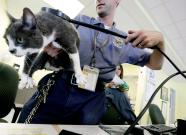
Los Angeles – A bill introduced in the California State Senate has already passed by a vote of 32-6 and is now scheduled to go to the House in the middle of August. The bill which has bipartisan support would require all dogs and cats that are adopted or claimed from a shelter be implanted with a microchip.
According to Sharon Curtis Granskog, spokeswoman for the American Veterinary Medical Association, “if passed, the measure, introduced by state Sen. Ted Lieu, D-Torrance, would be the first of its kind enacted in the U.S. A few states require shelters to scan but do not require them to actually microchip,” Granskog said. “New York has introduced a bill every year, including this year, that would make micro chipping dogs mandatory.” So far the bills have had no success in getting passed.
Besides the fact that micro chipping can help prevent the loss of a pet it can also help save costs associated with sheltering lost pets while trying to find their owners. It is estimated that tax payers in the state of California pay around $300 million each year to keep one million dogs and cats, housed, feed and over half are euthanized according to reports submitted by cities and counties to the California State Controller.
Authors of a study which included 53 shelters in 23 states between August 2007 and March 2008 found that shelters were able to locate pet owners three out of four times when the pet was micro chipped.
Co-authors of the study included Dr. Linda K. Lord, associate dean for student affairs at Ohio State University’s College of Veterinary Medicine, another veterinarian, a humane society representative and a consultant to a Canadian pharmaceutical company, which was also parent to a microchip manufacturer. When owners couldn’t be found, it was because of incorrect or outdated contact information in the chipmaker’s registration database, Lord said.
Micro chipping is not welcome by all according to Judythe Coffman of Rosamond, president of the California Federation of Dog Clubs, “We’re opposed to the mandatory micro chipping of owned dogs. That ought to be an owner’s choice. This is like saying we have to tattoo our kids.”
“They are not LoJacks or GPS devices,” said Aimee Gilbreath, executive director the Los Angeles-based charity Found Animals, which has donated some 200,000 free chips for area pets since 2005. “If you as a pet owner don’t keep the information up to date in the database, the microchip becomes pretty useless.”
“It absolutely does save animals, but we have to go with what we have,” said Wendell Bowers of Los Angeles’ East Valley Animal Shelter.
The micro chip is very small, around the size of a grain of rice. Micro chips stores a very tiny electrical charge which has a unique number associated with it when devices are used that can read the number. Otherwise the micro chip is considered inert. The cost to buy the chip and register pet’s contact information costs between $15 and $75.






That’s bullshit. All a pet owner has to do is have their social security number tatooed in the pets groin area. If dog or cat is found all that has to be done is contact the social security office and give the number to them and they will call the owner. There’s too much regulation and Big Brother crap going on in this country and the rest of the world and IT HAS TO STOP…!!! It’s all a CORPORATE MONEY MAKING SCEME FOR BIG BROTHER CONTROL.
Comments are closed.